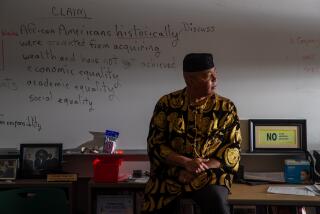Don’t Limit Youths to Ebonics
Speaking a second language, I have always believed, adds a certain advantage to one’s life. I am 39, African American and female. All of these characteristics have had advantages, and certainly disadvantages, in my life. I spent 12 years growing up in the Caribbean, where English was the primary language. However, with the island being British, and with the native dialect and my American accent, you could almost say I spoke a second language.
When I moved back to this country at 16, I knew clearly the difference between Bahamian dialect and standard American English. It was also made clear to me, by my teachers and other responsible adults in my life, that the dialect was fine when I was communicating with friends on the playground, and often was accepted among adults when there was a certain kinship, familiarity or comfort level.
Black English, as it is being called, can be useful for engaging young people, validating them for a difference they in many cases have chosen, or simply for understanding them. Too often I hear the desperation of adults trying unsuccessfully to reach out to the young. If Ebonics can help with this connection, then I am willing to embrace it, but only where it is needed. I hasten to say, I do not see the need to encourage young people to learn black English.
My initial reaction to the Oakland Unified School District’s decision to recognize Ebonics, and its potential impact on the Los Angeles Unified School District, was great concern. I do not want anyone to assume that my children, ages 9 and 7, should or would speak any English other than the standard English I insist they speak. Hearing that an African American member of the LAUSD school board embraces this idea without the much-needed study makes me a little nervous.
*
My children are getting a very good education at Van Gogh Elementary in Granada Hills. I would be very disturbed if their teachers did not speak standard English to them. I have already exposed them to other languages such as Thai, Spanish (not Spanglish) and French (not patois). My daughter Kelsey’s first words were in Thai. Through an exchange program that lasted for six months, we invited a woman from Thailand to live in our home. Both Kelsey and her brother Cody have taken Spanish classes in after-school programs, and now they are learning to sign. There is no need for them to learn black English. They are black children who are very much aware of and appreciative of their culture.
*
The temptation is so great not to meet the challenges we face in reaching a generation of young people of all cultures. I strongly believe that every child is reachable. Our jobs as parents, teachers and good neighbors are to expect the most of our children. We have to set the standards of excellence that they must meet.
One by one, we have to demonstrate for them that working hard prepares them for competition in life. The measurable outcome for years of sitting in a classroom is being able to compete globally. It is not acceptable to me that increasingly, African American children can only function in an environment that is familiar to them. We tell them the sky is the limit, and then we give them a stop sign.
I care about all of our children. African American young people already face greater challenges to opportunities in this country. If Proposition 209 ever is implemented, the struggle to succeed will only get worse. I sense that on the basis of merit, those who are fluent only in black English would not stand a chance.
More to Read
Sign up for Essential California
The most important California stories and recommendations in your inbox every morning.
You may occasionally receive promotional content from the Los Angeles Times.










